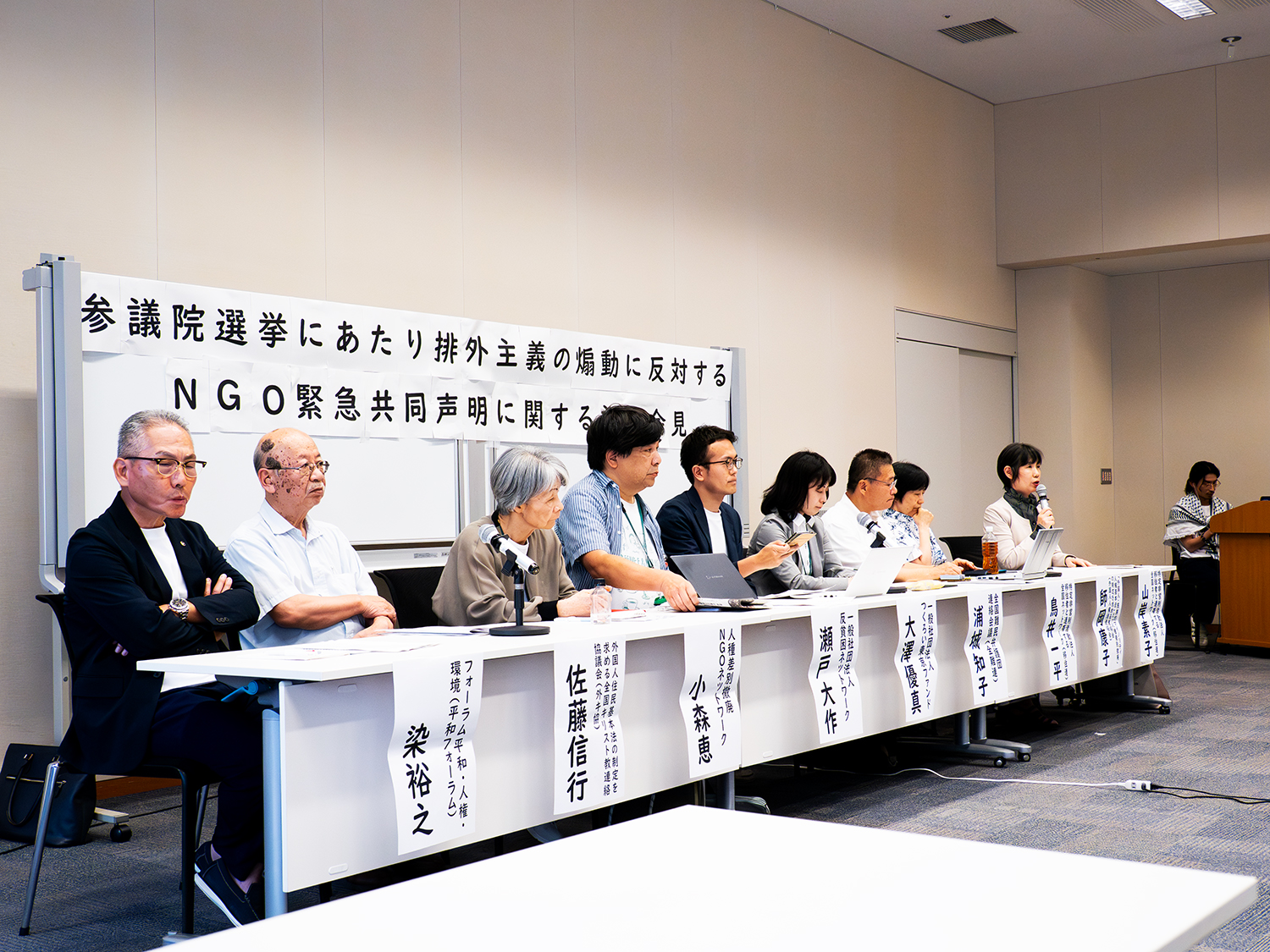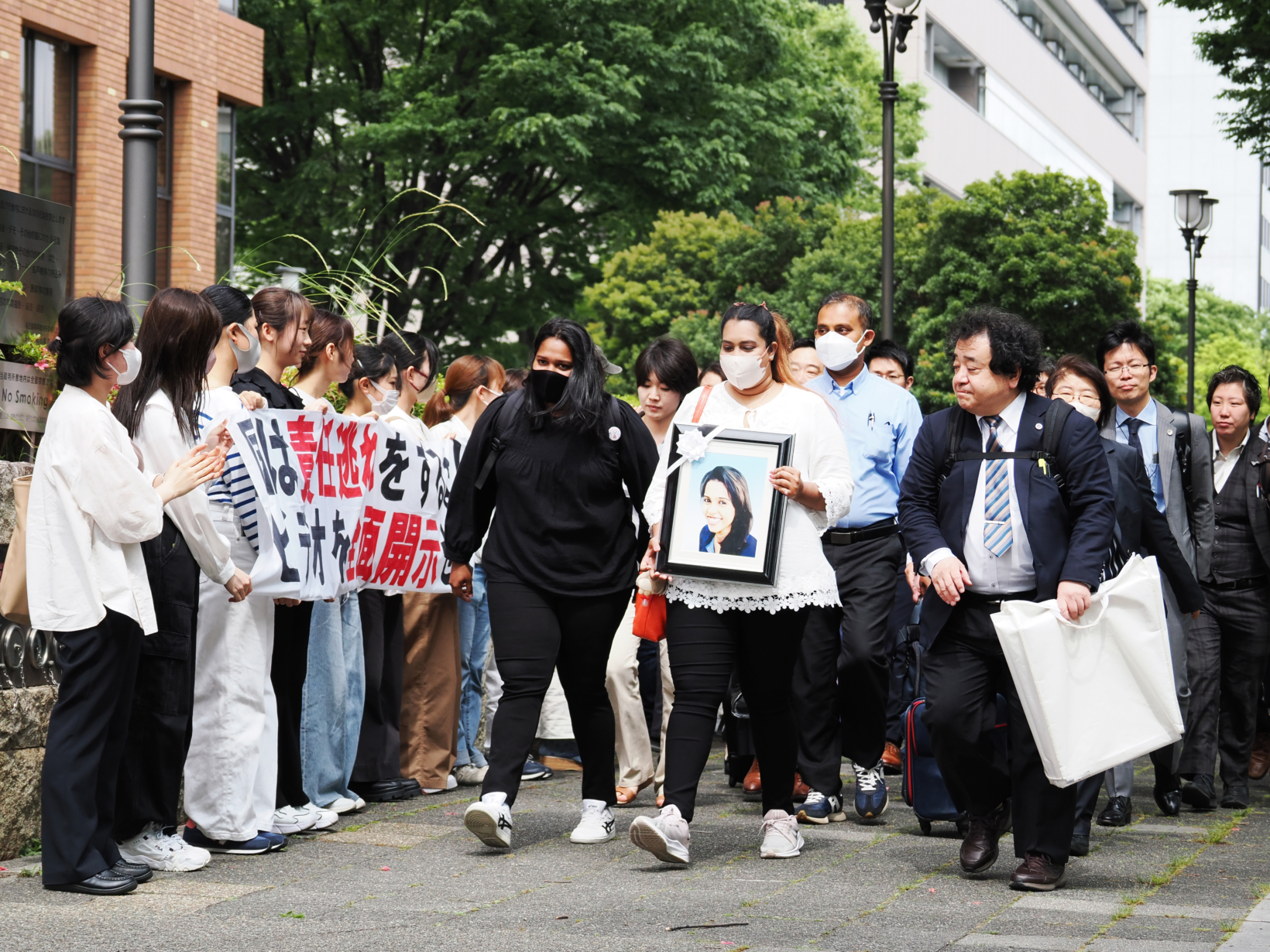Reasons why the deliberations on the Immigration Law are invalid: Collapse of legislative facts, concealment, and falsehoods
本記事は、2023年6月7日時点での「入管法改定案」の審議の状況を伝えるものです。最新の情報は適宜ほかの情報も参照ください。
The ruling party is about to vote on the government’s immigration bill, which has been under discussion in the House of Councillors. Of course, the content of the bill is a matter of concern, but the process of deliberation has revealed a situation that undermines the basic facts of legislation every day. We organized what was revealed during this deliberation, what was not revealed, and the reason why a decent deliberation could not be held.
(1)Sloppy reality of Refugee examination counselors(2)Collapse of the legislative facts due to the minister’s “correction of statements”
(3)Believe me!(Even there is no evidence)
(4)Doctor drinking alcohol at the Osaka Immigration Bureau and the fake report
(5)Responsibility of the minister concealing information
(6)Incident of Ms.Wishma Sandamali hasn`t yet been clarified
(7)Release of a new violence video
(8)Status of residence of children is being used as a trading material

Contents 目次
- (1)Sloppy reality of refugee examination counselors
- (2)Collapse of the legislative facts due to the minister’s “correction of statements”
- (3)Believe me!(Even there is no evidence)
- (4)Doctor drinking alcohol at the Osaka Immigration Bureau and the fake report
- (5)Responsibility of the minister concealing information
- (6)Incident of Ms.Wishma Sandamali hasn`t yet been clarified
- (7)Release of a new violence video
- (8)Status of residence of children is being used as a trading material
(1)Sloppy reality of refugee examination counselors
On May 25, the number of refugee review handled by Ms. Fusako Yanase, a refugee examination counselor , for two years was revealed at the House of Councilors Judicial Committee.
2021: 6741 cases for total, 1378 cases handled (34 working days)
2022: 4740 cases for total, 1231 cases handled (32 working days)
(*)One of the working days is for a meeting without review.
The Refugee examination counselor is appointed by the Minister of Justice. She/He is responsible for reviewing the appeal of foreigners who have been denied refugee status by the Immigration Bureau (first review) and who have filed an appeal.
Although there are 111 refugee examination counselors, Ms. Yanase’s team(usually 3 members) handled more than a quarter of all cases in 2022. On average, only 6 minutes would be spent on each case.The Immigration Bureau repeatedly explains that “it is not imbalance”. But It is like arguing that something is “not black” when you see it is black.
In addition, Mr. Akihiro Asakawa, a current refugee examination counselor, who spoke as a reference on May 25, 2023, said that he had also handled more than 1,000 cases a year in written reviews, just like Ms. Yanase.
However, it is not clear how many cases he handled on average per day, as he avoided stating the number of working days. He also said, “I have reviewed 50 debt cases at one working days.”
It seems that cases that are considered to be similar in trend by the Immigration Bureau are being passed on to the refugee examination counselor in bulk.
In addition, Asakawa said:
“There were not many cases where it was necessary to refer to the country of origin information of the refugee applicants.”
At a press conference on the same day, lawyer Shogo Watanabe, who spoke as a reference person too, expressed his doubts that it is impossible to only listen to the personal facts of the applicant and not refer to the current information of country of origin.
In light of this, the Refugee examination counselors system cannot be called a “third-party system.”
He, Mr. Asakawa has his book titled “The lie of the theory of Zainichi”, “The Privilege of Zainichi”.
The Ministry of Justice and the Minister of Justice are in a position to sound the alarm against hate speech and hate crimes, but there are also personnel issues as to why such a person was appointed.
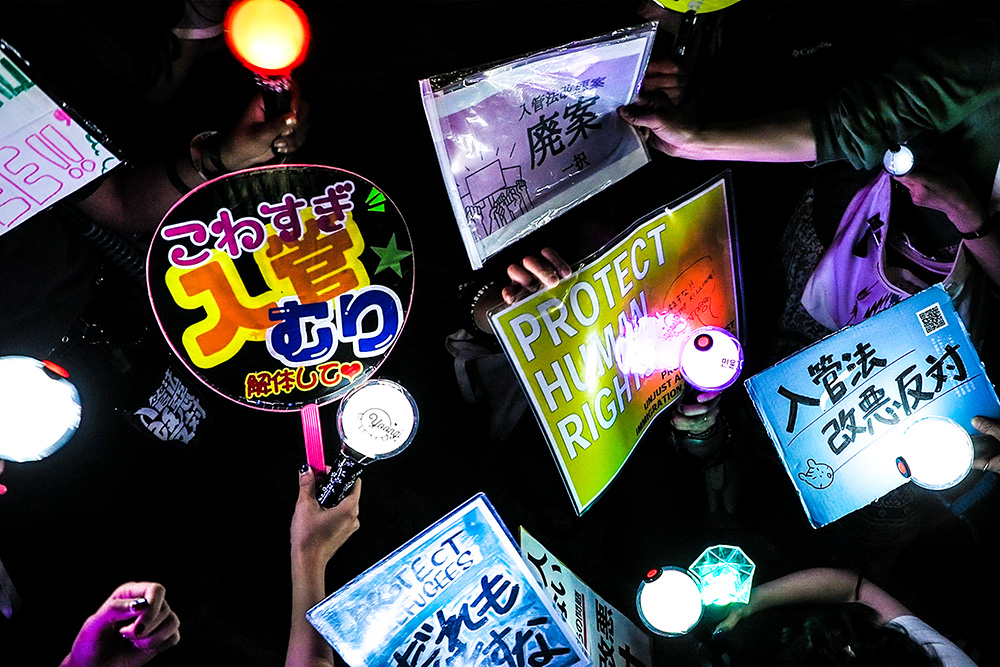
Messages put up by people who gathered at the demonstration against the bill.
(2)Collapse of the legislative facts due to the minister’s “correction of statements”
Ms. Yanase said the following about the face-to-face review.
[November 2019] “Face-to-face interview of 1500 people” (Expert Committee on Detention and Deportation)
[April 2021] “Face-to-face interview of 2000 people” (House of Representatives Judicial Committee)
= 500 more face-to-face interviews in a year and a half…?
She was a member of “the Expert Committee on Detention and Deportation” and the recommendations of this expert committee formed the basis (legislative fact) of the bill.
Ms. Yanase said in the House of Representatives Legal Affairs Committee in April 2021 that “it is almost impossible to find refugees.” This statement has also been cited in a document from the Immigration Bureau this year as the basis for a bill that would make people who have been twice denied refugee status subject to deportation even if they apply for refugee status again.
However, looking at the number of cases that Ms. Yanase claimed, it can be seen that the number of face-to-face reviews increased by 500 people in one and a half years. This raises the question of whether a fair review was conducted.
On May 30, 2023, Justice Minister Saito was asked about the “500 face-to-face hearings in 18 months” by a journalist. In response, Saito said, “It is possible to conduct 500 face-to-face interviews in 18 months.”
However, Saito later retracted his statement, saying that it was “impossible” to conduct 500 face-to-face interviews in 18 months. The statement was difficult to rephrase as “impossible” in the context, so it was an unnatural “correction.”
The Minister of Justice himself denied “the number of reviews” that Ms. Yanase has been talking about, saying that it is “impossible.” This means the collapse of the “legislative fact.”
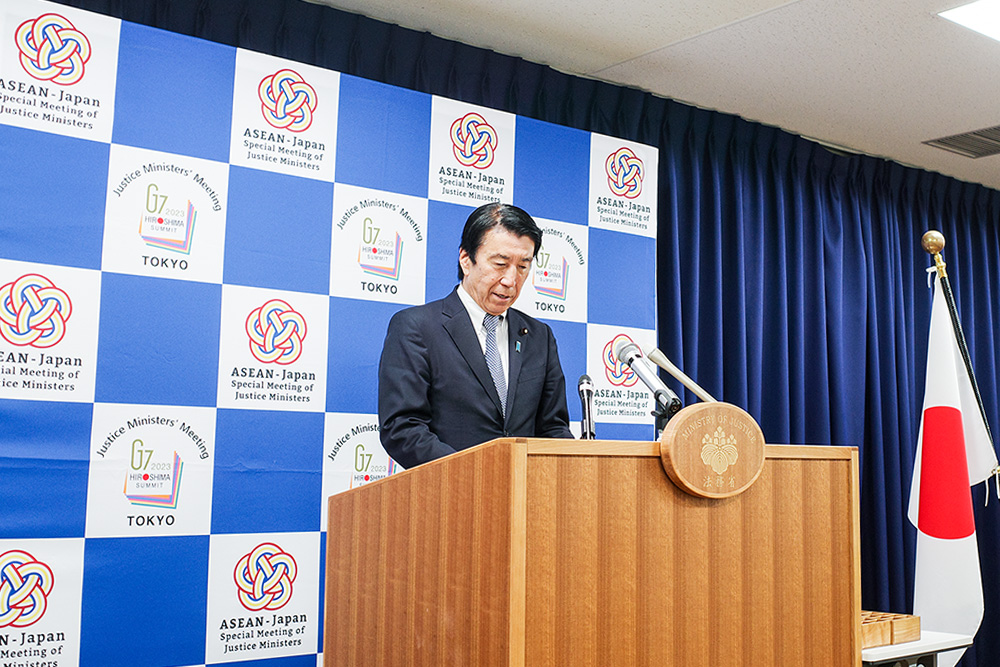
Minister of Justice continues to cover up and deceive.
(3)Believe me!(Even there is no evidence)
In April 2021, Ms. Yanase claimed that she had conducted 2,000 face-to-face reviews since the system began. This is a very unrealistic number. On this number, Justice Minister Saito has been arguing that it is a “careful face-to-face review” (not a careless review).
People are questioning the unrealistic number of 2,000 face-to-face interviews in 16 years, which is equivalent to meeting 130 face-to-face interviews per year on average.
It has been revealed that Ms. Yanase herself later told her supporters that she could only manage to conduct 90 to 100 face-to-face interviews at maximum per year.
However, the number of reviews conducted by Ms. Yanase before 2021 has not been made public.The Immigration Bureau has repeatedly said that it does not compile the number of annual reviews conducted by each counselor.
Ms. Yanase has not been invited to the Diet as a reference person for some reason.Minister Saito said, “Regardless of the numbers, Ms. Yanase’s remarks have a certain credibility.” It’s same as saying thet “Believe me!(Even there is no evidence)”
An organization that does not even collect basic information cannot accurately grasp the current situation. Why are they so adamantly refusing to disclose it?
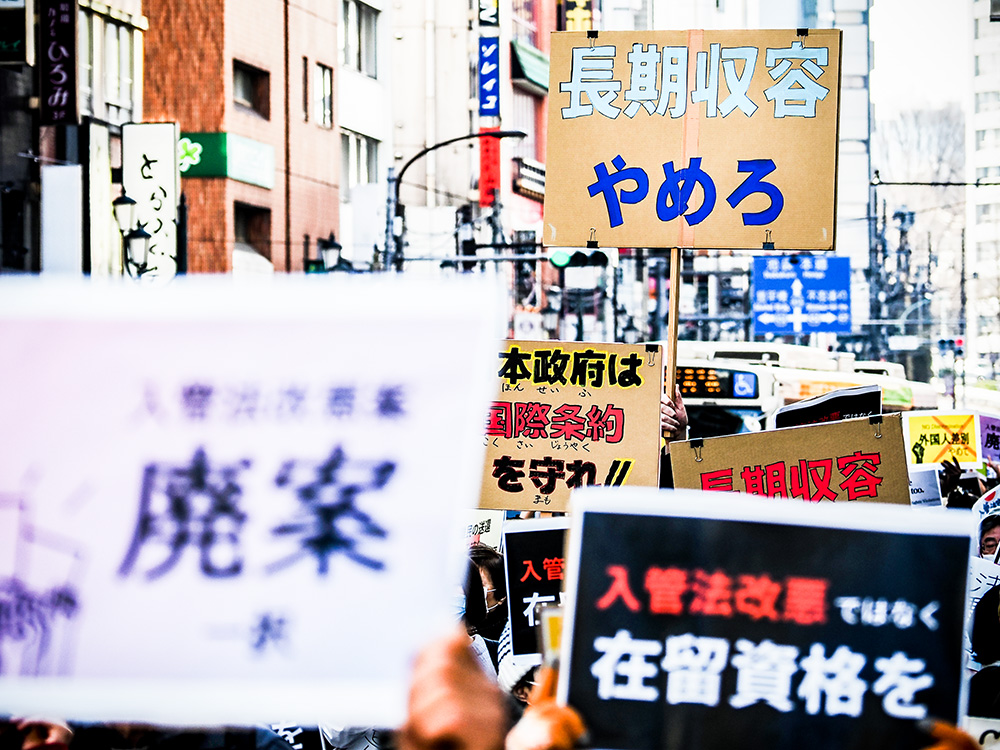
Protests against the bill are taking place in over 80 locations across the country.
(4)Doctor drinking alcohol at the Osaka Immigration Bureau and the fake report
The full-time doctor at the Osaka Immigration Office is pointed out to have been in charge of medical treatment while drunk.
The doctor was hired in July 2022 to strengthen the medical system at the facility. On January 20, 2023, she came to work with a stumbling gait and alcohol was detected in her breath test.
Since that day, she has not been in charge of medical treatment, but there are no other regular doctors, and currently part-time doctors are in charge of the response. On June 3, opposition lawmakers visited the Osaka Immigration Office and found that the doctor was still employed, although she was removed from medical duty.
However, in April 2023, the Immigration Bureau published a document on the status of implementation of improvement measures, which listed the doctor as “1 regular doctor” in the Osaka Immigration Office column. When the Immigration Bureau was asked about this, it was revealed that the doctor was the same person who performed the drunken medical treatment, and that she had already left the medical duty at the time of the publication of the document.
In other words, the Immigration Bureau counted a doctor with no medical practice as a “regular doctor” and listed it in a document that shows the basis for the improvement of the medical system. If this is the case, it is impossible to trust the materials submitted by the Immigration Bureau without investigating the “reality” of other facilities.
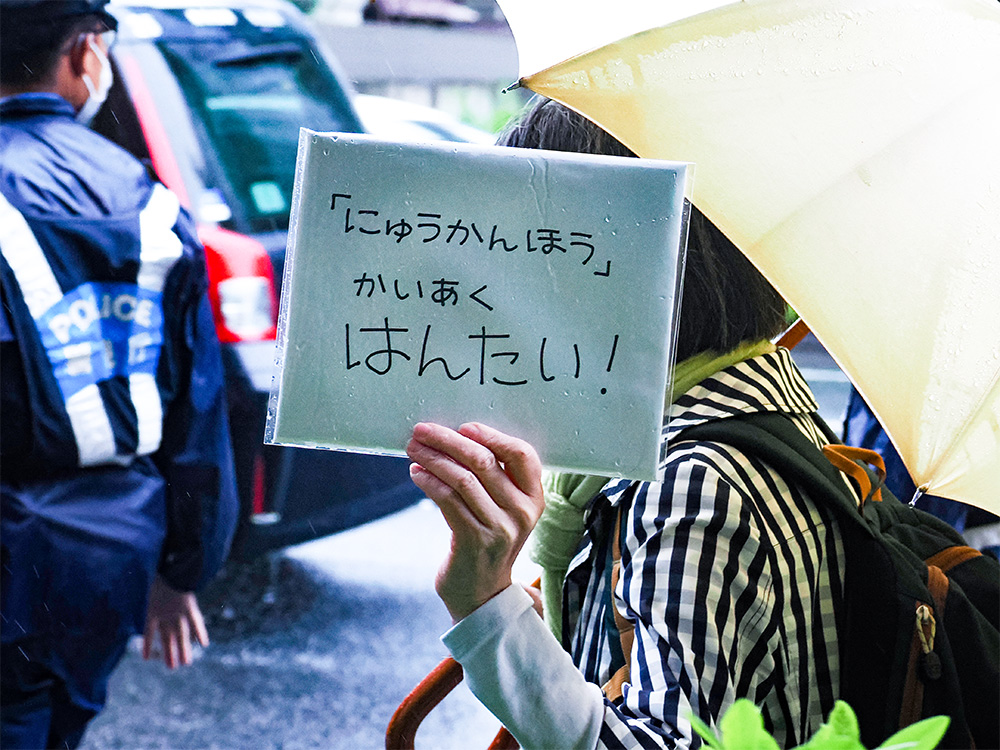
Said “Opposition to revision of immigration law”
(5)Responsibility of the minister concealing information
Sohei Nihi, a member of the House of Councillors, obtained a document through the Akahata newspaper that revealed that the doctor in question had 0.36 mg of alcohol per liter of breath. Thinking about “driving under the influence of alcohol”, the license will be cancelled for 2 years if it is more than 0.25 mg. The document also mentions strange behavior of the doctor that appears to be the result of alcohol consumption.
Justice Minister Saito said he received a report about the doctor in question in “late February” this year. However, until the matter came to light in the news on “June 1st”, neither the Ministry of Justice nor the Immigration Bureau ever mentioned the doctor in question in public.
In fact, when the bill was being debated in the House of Representatives, the minister replied as follows:
(April 19:House of Representatives Judicial Committee)
“I believe that the reforms are having a real impact, such as strengthening the medical system by securing full-time doctors and promoting a change in staff awareness.”(April 21:House of Representatives Judicial Committee)
“We were able to secure new full-time doctors in four locations, including the Nagoya Bureau.”(April 25:House of Representatives Judicial Committee)
“We are actually making progress in strengthening the medical system by securing full-time doctors at each facility and promoting a change in staff awareness.”
The Immigration Bureau has explained that it has not made the information public because it is “conducting a careful investigation.” However, why can’t that “carefulness” be used in refugee screening and investigation?
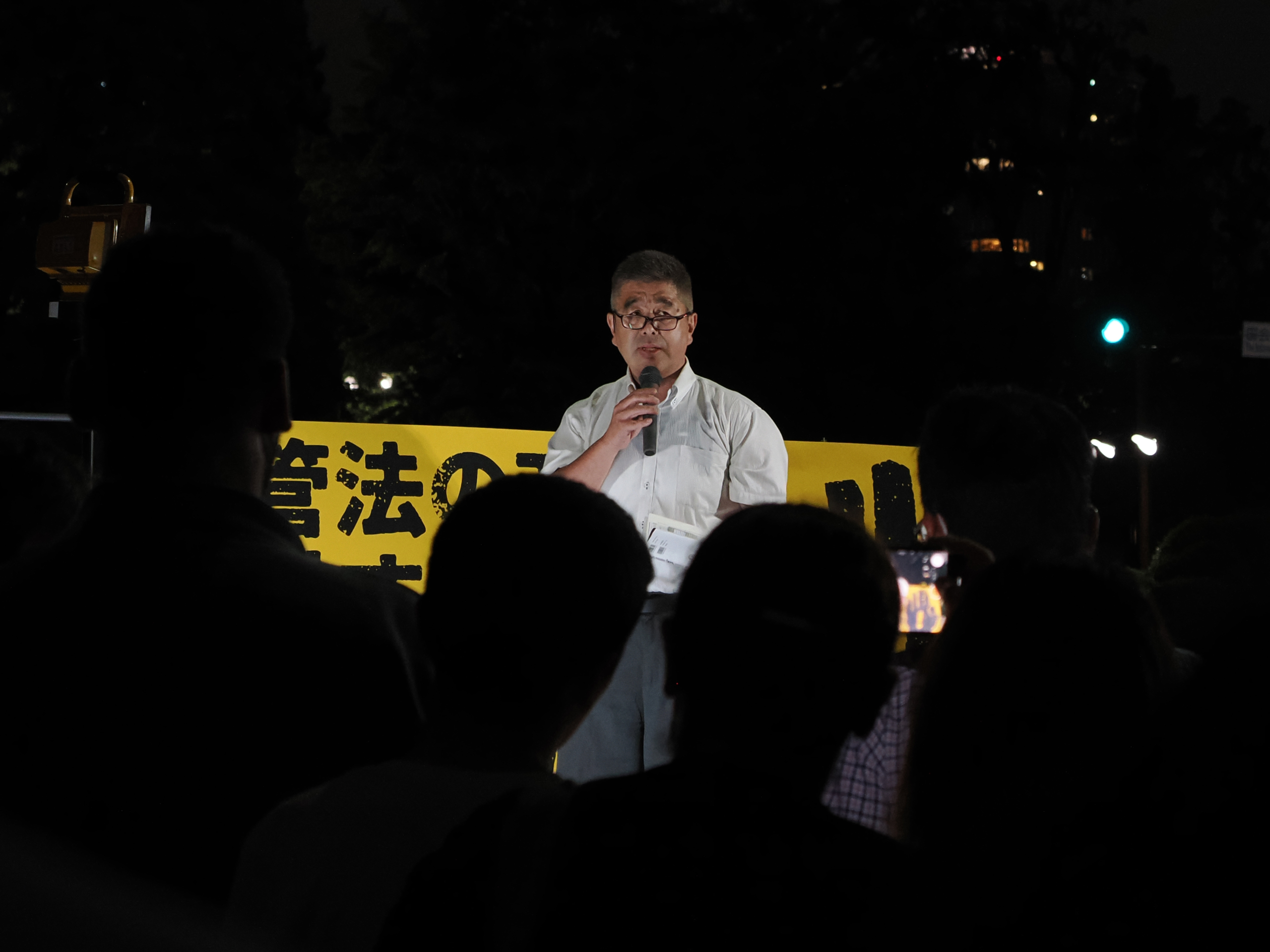
Lawyer Kodama giving a speech in front of the Diet.
(6)Incident of Ms.Wishma Sandamali hasn`t yet been clarified
In June 2017, Wishma came to Japan from Sri Lanka with a dream of becoming an English teacher, wanting to teach English to Japanese children. However, she was unable to attend school and lost her visa.
Ms.Wishma Sandamali was detained in the Nagoya Regional Immigration Services Bureau in August 2020. She was receiving domestic violence from her then-cohabiting partner. The man had sent a letter to the immigration office threatening to punish Wishma if she returned to Sri Lanka. Therefore, Wishma claimed that she could not return to Sri Lanka. She became ill while in detention, but she could not receive treatment such as hospitalization and intravenous drip, and she died in March 2021.
One of the most important “evidence” for clarifying the truth is the 295 hours of surveillance camera footage of the room where Wishuma spent her last time. Only about 5 hours have been submitted to the court by the government.
The essence of Wishuma’s death incident is not a superficial problem of “a weak medical system.”
The final report about the incident states that the reason for denying Wishma’s “Kari Homen” ,provisional release, was that “It is necessary to deny provisional release once, make her understand her position, and strongly persuade her to return to Sri Lanka.” In other words, it is shamelessly written that the detention in a painful environment was used as a “means” to make her give up staying in Japan. It is obvious, but the detention should not be used arbitrarily by the immigration office as a “torture tool.”
The detention practices of the Immigration Office have been criticized by the UN Human Rights Council’s Working Group on Arbitrary Detention, which adopted an opinion in 2020 stating that they violated the International Covenant on Civil and Political Rights, Article 9, and other international law. However, the Japanese government has not responded to these criticisms.
The Immigration Office calls people who cannot return to their home countries due to reasons such as Ms.Wishma “deportation avoidance”. They also set a “deportation avoidance reduction target” that shows how many people will be deported. As a result, it has been pointed out that the operation of the Immigration Office is based on deportation, and that “making numbers” is prioritized over considering individual circumstances.
The immigration authorities have responded that they have not set any goals since the 2020 fiscal year, when the coronavirus pandemic began. However, documents obtained by Communist Party lawmaker Mr.Nihi show that “target numbers” were also shown in documents created within the immigration authorities after that. This is also at odds with the explanation of the Immigration Bureau.
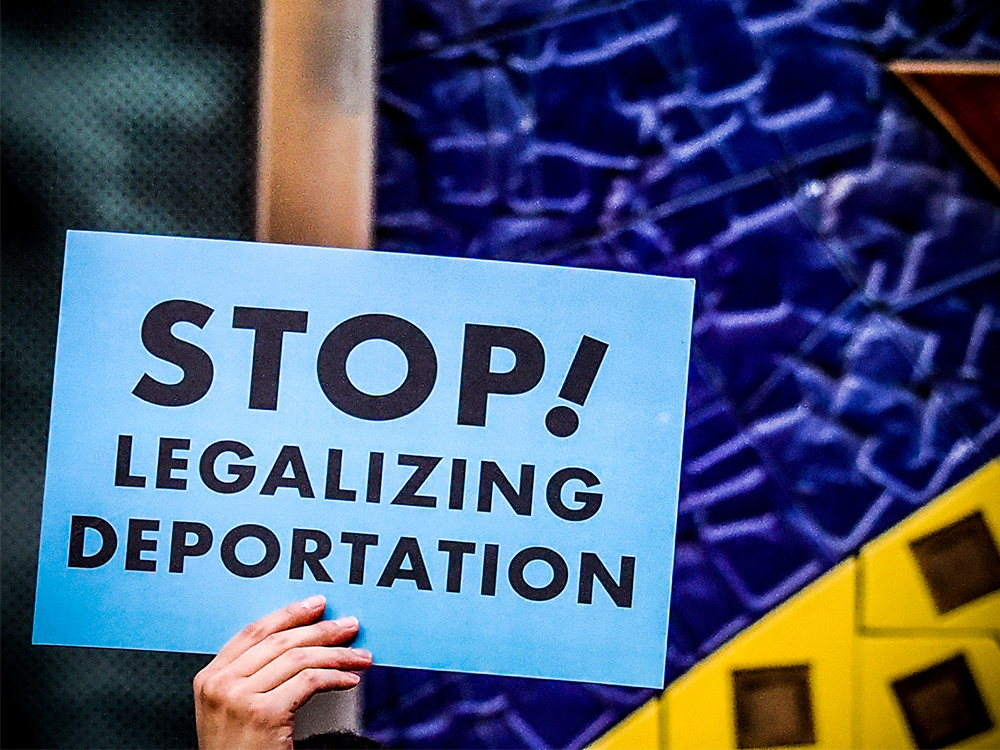
(7)Release of a new violence video
In a lawsuit filed by Mr.Deniz, a Turkish Kurdish origin, seeking compensation for damages, of assault by staff during his detention at the East Japan Immigration Control Center, the Tokyo District Court ruled in April that some of the staff’s actions were illegal and ordered the government to pay 220,000 yen.
In January 2019, Mr.Deniz protested after being denied sleeping pills.
Then, around seven or so immigration officers entered the room and ordered Mr.Deniz to move. Upon reviewing the footage at the time, it is said that Mr. Deniz was handcuffed from behind, rendered unable to resist, and one of the officers pressed on the sensitive area under Deniz’s chin, loudly asking, “Does it hurt!?” Deniz’s face contorted in pain, and the voice saying, “It hurts!” echoed in the room.
The verdict declared such acts of violence as “illegal” without any justification or necessity.
Security guard A, who engaged in acts of violence, testified that he had learned such actions as a part of his “training.” If these actions were indeed conducted during the training within the immigration facility, there is a possibility that other detainees may have also suffered harm. However, the verdict did not delve into that aspect.
And recently, a new video of assault was released. Please be cautious when viewing as it contains intense content.
[Partial footage] (*) Contains scenes of violence, please be aware when viewing.
(The video is from the YouTube channel of the “Association for Supporting Kurdish Refugee M.”)
This is a video of an African man who was informed of the denial of his refugee application on December 23, 2019, and was taken to Narita Airport Branch from the East Japan Immigration Center for deportation. With the enactment of the Immigration Control Act by the government, individuals who have been denied refugee status twice may become subject to deportation, and there are concerns that such acts of violence will further normalize. “Refusing deportation” itself can also be subject to criminal penalties.
(8)Status of residence of children is being used as a trading material
Despite being born and raised in Japan, it has been revealed that there are 201 children under the age of 18 without “residence status” as of the end of last year, 2022.
If the bill is passed, there is a fear that these children may also be subject to deportation. In the “amendment proposal” presented during the deliberation of the Immigration Control Act revision bill in the House of Representatives Judicial Committee, it was stipulated to explicitly consider the “best interests of the child” when determining the special permission of residence based on humanitarian considerations.In other words, they hinted, “We will grant special permission to reside” to children who were born and raised in Japan or have a living foundation in Japan.
However, later on, the Constitutional Democratic Party opposed the bill, and the amendment was removed. However, granting residence status to children and their families should be possible immediately even under the current law.
In response, Professor Nanako Inaba from Sophia University stated the following in a Mainichi Shimbun article:
Since all minors under the age of 18 are considered protected individuals, there is no distinction between “irregular stay” and “regular stay” to begin with. Even Minister Gérald Moussa Darmanin(France), who advocates for early repatriation, stated, “After just two years, individuals have the right to work, have children, and establish the right to stay in France. At that point, they cannot be deported”
While neglecting basic humanitarian principles, using “granting residency status to children if our bill is approved” as a “bargaining chip” — Isn’t this attitude itself a significant lack of awareness regarding human rights?
In this way, issues prior to the approval or disapproval of the bill are being revealed one after another through the deliberations. The deliberations cannot continue while leaving clear doubts unaddressed. Moreover, if they were to proceed with a forced vote, it would fundamentally undermine parliamentary democracy.
Even if one agrees with the content of the bill, the awareness of the problem that deliberations are being conducted while the legislative facts are in doubt can be shared based on the various “contradictions” mentioned above.
(8, June. 2023/ Translation Kei Sato)
*the original article
Who`s Dialogue for People(D4P)?
